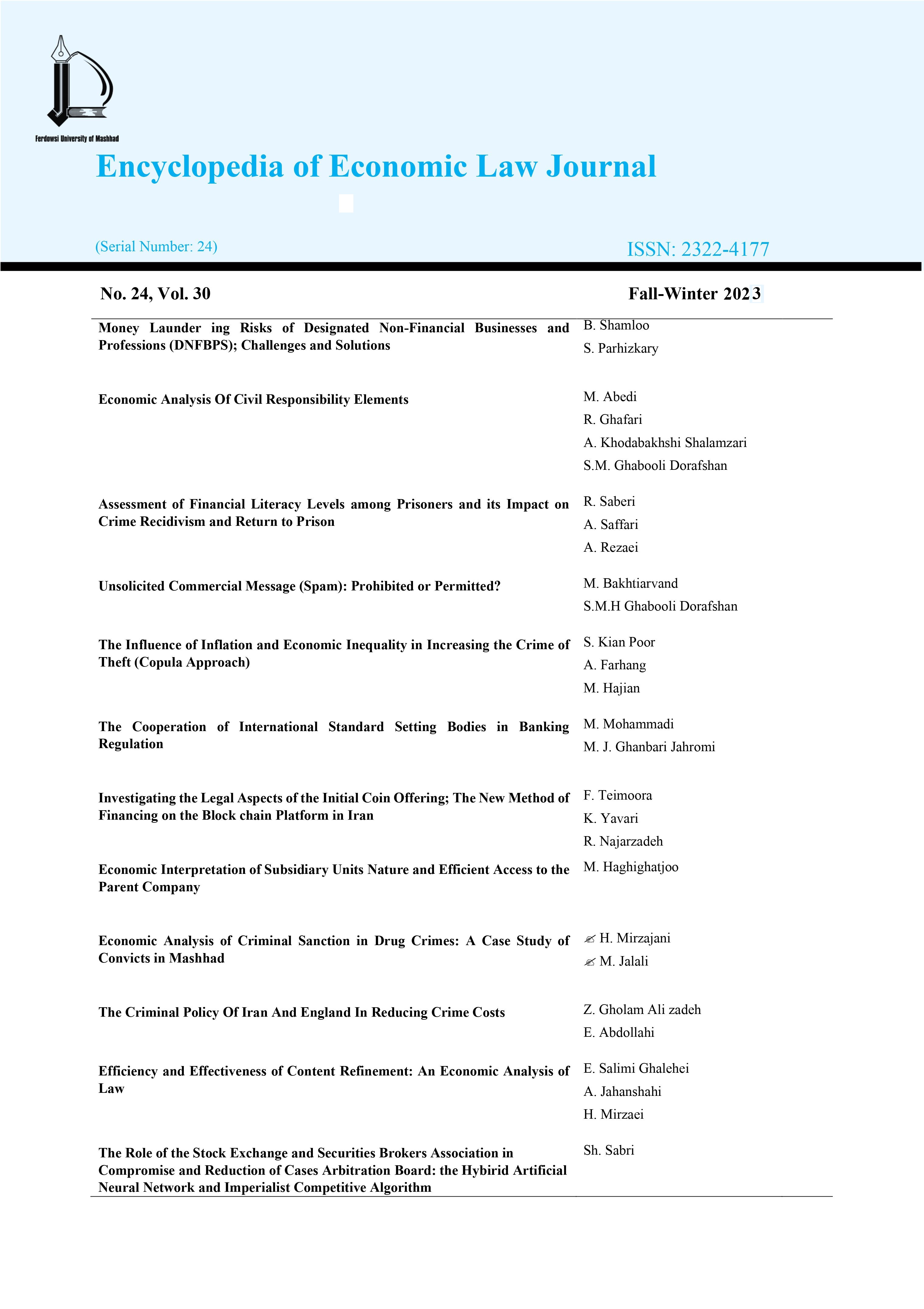Document Type : Scientific research
Authors
1 Assistant Professor, Department of Criminal Law and Criminology, Faculty of Law and Political Science, Islamic Azad University, Branch of Mashhad, Mashhad, Iran
2 Phd Student of Criminal Law and Criminology, Faculty of Law and Political Science, Islamic Azad University, Branch of Mashhad, Mashhad, Iran
Abstract
Criminals often engage in a calculated assessment of the potential gains and risks before committing a crime.Criminal strictness in drug crimes and the relative retreat of the Iranian legislature in the face of heavy punishments such as death in 2016 require that the issue of the effectiveness of criminal enforcement be examined from the perspective of those convicted of crimes in this area. Therefore, the present research seeks to analyze the economic analysis of criminal enforcement in drug crimes. This research is descriptive-exploratory in terms of its applied nature and methodolog. To assess the economic analysis of punishment by criminals, individuals convicted of drug-related crimes were systematically identified. The statistical population of this study comprises all individuals with a definitive history of drug-related convictions in the city of Mashhad. Given the lack of precise information on the number of convicts, a sample size of 160 individuals was selected from the accessible population. The data collection tool in this study was a researcher-designed questionnaire, which underwent content and face validity confirmation through expert opinions. Its reliability was calculated using Cronbach’s alpha coefficient, resulting in 0.89. For data analysis, various statistical methods such as t-tests, ANOVA, and basic statistics like mean and standard deviation were employed. Based on findings from convicts’ opinions on drug-related matters, criminals involved in drug crimes perceive the costs of long-term imprisonment and asset forfeiture to be greater than execution. Surprisingly, this contradicts the conventional assumption that the cost of execution outweighs any other crime. Therefore, when assessing the benefits and desirability, it is essential to consider the context and specific circumstances rather than treating criminals as abstract and fixed entities. In practice, the utility versus cost trade-off is evaluated by criminals on a case-by-case basis, accounting for situational factors. Also, statistical analysis showed that with increasing age, level of education and history of committing, attention to economic analysis of punishments is done more accurately.
Keywords
©2024 The author(s). This is an open access article distributed under Creative Commons Attribution 4.0 International License (CC BY 4.0)
- Becker, S. Crime and Punishment: An Economic Approach. Journal of Political Economy, 76(2), 169-217, 1968
- Becker, G.S. “The Economic Way of Looking at Behavior”, Journal of Political Economy, Vol. 101, 1993
- Becker, G.S., “Irrational Behavior and Economic Theory”, Journal of Political Economy , Vol. 70, 1962
- S. Fisher and Steven.P. Lab, Encyclopedia of Victimology and Crime Prevention, Volume 2, translated by professors of criminal law and criminology, under the supervision of Ali Hossein Najafi Aberandabadi, Mizan Publishing, Tehran, 2014 [In Persian].
- Elster, J., Reason and Rationality (Steven Rendall, Trans.), Princeton: Princeton University Press, 2009
- Engelen, B., Rationality and Institutions: an Inquiry into the Normative Implications of Rational Choice Theory (Doctoral Dissertation), Katholieke Universiteit Leuven. Retrieved from: http: //lirias.kuleuven.be/handle/1979/975, 2007
- Friedman, Lawrence. Deterrence, Translated by Ruhollah Talebi Arani and Askar Kahramanpour Banat, third edition, Tehran: Strategic Studies Research Institute, 2011 ([In Persian].
- Haddad Zadeh, mohammadreza Et Al., Analyzing the effectiveness of execution in drug crimes in the light of theories of economic analysis of crime, Criminal Law research Journal, Vol 8 (31).2019, [In Persian].
- Hedstorm, Peter, Rational choice and sociology, the new palg rave dictionary of economy, 2004
- Hobbes, Diode, An Essay on the Principles of Ethics, translated by Majid Davoodi, Markaz Publishing, First Edition, Tehran, 2009 [In Persian].
- Javan Jafari, Abdul Reza; and Seyyed Mohammad Javad Sadati. Philosophical and sociological nature of punishment, Tehran: Mizan publishing house. 2015 [In Persian].
- Javan Jafari, Abdul Reza; Et al. Deterrence and its measurement in punishment, criminal law research journal, Year 7, Number 2. 2016 [In Persian].
- Merle, Jean-Christopher, German Idealism and The Concept of Punishment, Cambridge University Press, 2009
- Siegel, larry, criminology, wadsworth, fourth edition, 2011
- Simonson, I. and A. Tversky , “Choice in Context - Tradeoff Contrast and Extremeness Aversion”, Journal of Marketing Research, Vol. 29, No. 3. 1992
- Tonry,Michael, , The handbook of crime and punishment, oxford university press, 1998
- Wilkinson, N, and M. Klaes , An Introduction to behavioral Economics, Hampshire: Palgrave Macmillan. 2012
- Winter, Harold, The Economics of Crime, translated by Hamid Bahremand Baghnazar and Zahra Sakiani, Justice, Tehran, 2015 [In Persian].
- Yadipour, Mahdi, An Introduction to Law and Economics, Tehran, Imam Sadegh University Press, 2010 [In Persian].
- Zaman Zadeh, Akbar, 2017, Drug criminals as high-risk criminals in Iran's criminal justice system, Private and Criminal Law Research Quarterly, Vol 13 (3). [In Persian].


Send comment about this article